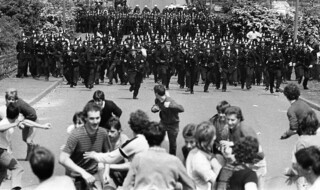‘After the Strike’
Tom Overton
In the BBC TV play Threads, broadcast on 23September 1984, the nuclear bomb that drops on Sheffield is something of a social leveller. Mr Kemp, an out-of-work steelworker, is badly burned in his terrace house and his young children are killed outright. But there’s little to envy in the extra few days endured by the steelworks manager Mr Beckett and his family in the sturdy cellar of their large suburban semi. Just before the bomb falls, CND activists are rounded up. Police muscle into a demonstration and snatch a trade unionist calling for a general strike. Barry Hines’s screenplay was a response to Thatcher and Reagan’s economic policies as well as their nuclear brinkmanship.
Hines began his working life as an apprentice mining surveyor near Barnsley, before an older colleague told him he needed to get out and use his brain. In novels like A Kestrel for a Knave (1968), or the two-part TV play The Price of Coal (1977), he was unsentimental about the work without forgetting that it was the warp of the social fabric around him. By the time Threads went to air, Hines was working on a direct response to the 1984-85 miners’ strike. Keith Brookes, an NUM industrial relations officer in Sheffield, remembers taking him to the Orgreave Coking plant a few weeks after the battle on 18 June 1984, and showing him where the mounted police had ridden into the ranks of the pickets.
Hines didn’t publish anything directly about the strike until the novel The Heart of It (1994), in which a Hollywood screenwriter returns to visit his ailing ex-miner father. He wrote three TV plays – The Diggers and After the Strike, based on his NUM trips, and Slate, which looked back to earlier struggles – but they never made it to the screen. There were political obstacles to their being produced, but Hines also had doubts about their rawness, their ‘coming at the subject like a bull at a gate’. The scripts were among the papers donated to the University of Sheffield after Hines died in 2016.
On 18June 2019, the 35th anniversary of Orgreave, After the Strike was given a read-through at Kelham Island Industrial Museum in Sheffield: its first public performance. The parts were read by volunteers from local families, and the narrator was Dave Forrest, who teaches at Sheffield and, with his colleague Sue Vice, has written a book on Hines’s work. Bill McDonnell cut the two-hour play down to a 45-minute version. It covers the strike from the perspective of the men of the community – the injury of the police violence, the insult of the way the miners were treated by the criminal justice system – but also the way they were kept going by such groups as Women against Pit Closures. Two members of WAPC, Flis Callow and Caroline Poland, spoke before the read-through.
There are bitter references to Neil Kinnock (who had written to Hines to praise Threads in 1984), and gestures to international solidarity: a member of the SPD comes to visit and invites one of the women to speak about the struggle in Cologne; the violence is described as ‘like something you’d see in South Africa’. Another of the speakers at the Kelham Island event was Chris Hockney from the Orgreave Truth and Justice Campaign. The police have not been held to account for the violence on the day or the corruption that followed. Ninety-five miners – who could have worn protective work clothing if they’d been preparing for violence, as the police claimed, but wore T-shirts and trainers instead – were prosecuted, and many were driven from their homes by punitive bail conditions. All of the cases collapsed when it became clear that the police had fabricated evidence.
After Theresa May, as home secretary, unexpectedly ordered a new inquiry into the Hillsborough disaster, it was widely thought that an Orgreave inquiry would follow; her then chief of staff, Nick Timothy, argued as much on the ConservativeHome blog in 2016. May’s successor, Amber Rudd, failed to deliver; and Sajid Javid earlier this year rejected an offer by the bishop of Sheffield to set up an independent panel. The 2017 Labour manifesto included a commitment to opening an inquiry.
The performance at Kelham Island didn’t pretend to be a polished work of theatre; Forrest spoke instead about opening up the archive of a writer who was deeply committed to the area. After the Strike is concerned in part with the ways memory can be kept going in communities. This production in particular emphasised the songs from the period: ‘Coal Not Dole’, ‘We Are Women, We Are Strong’. Sitting in the front row, Women against Pit Closures sang along.
